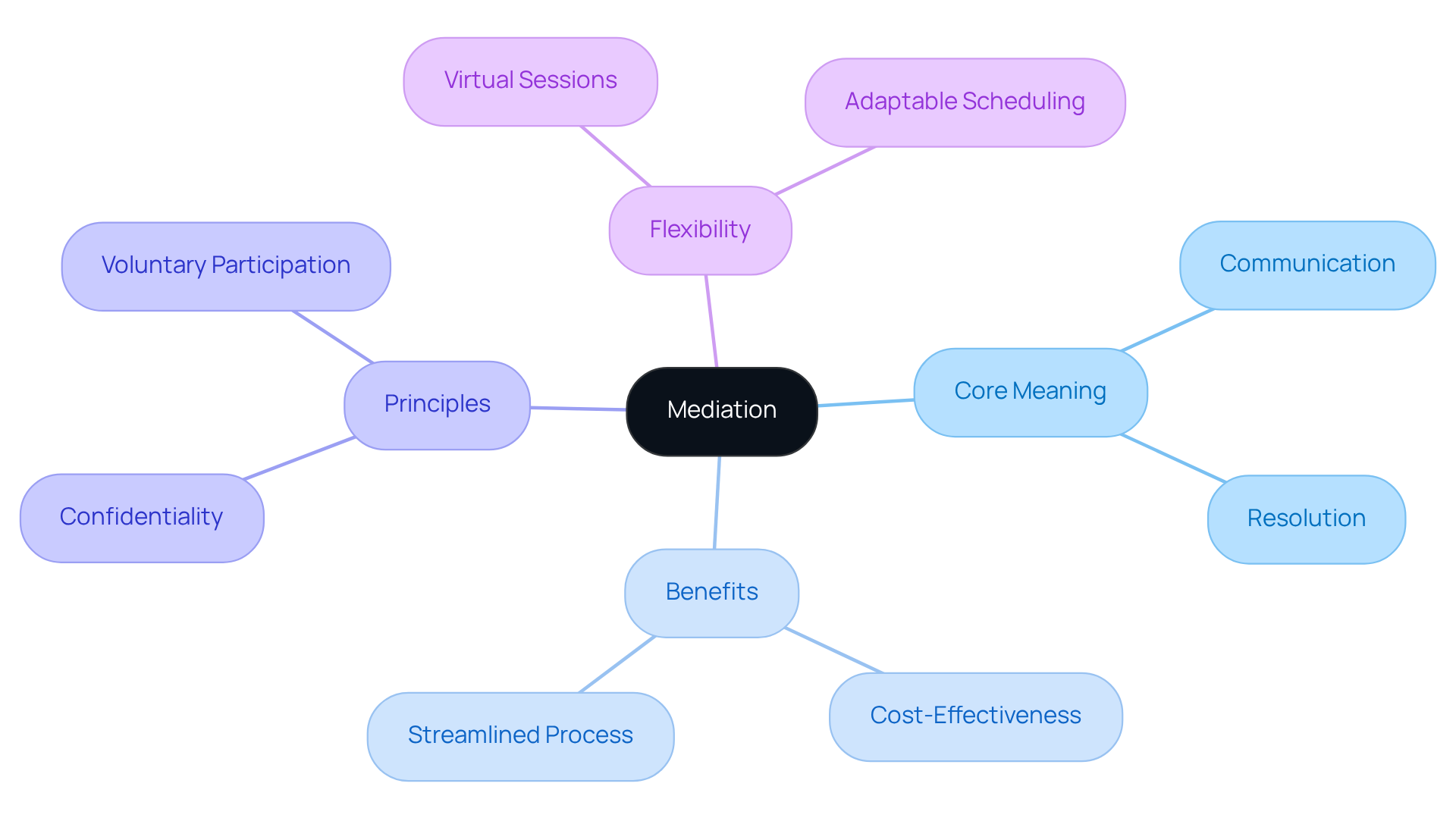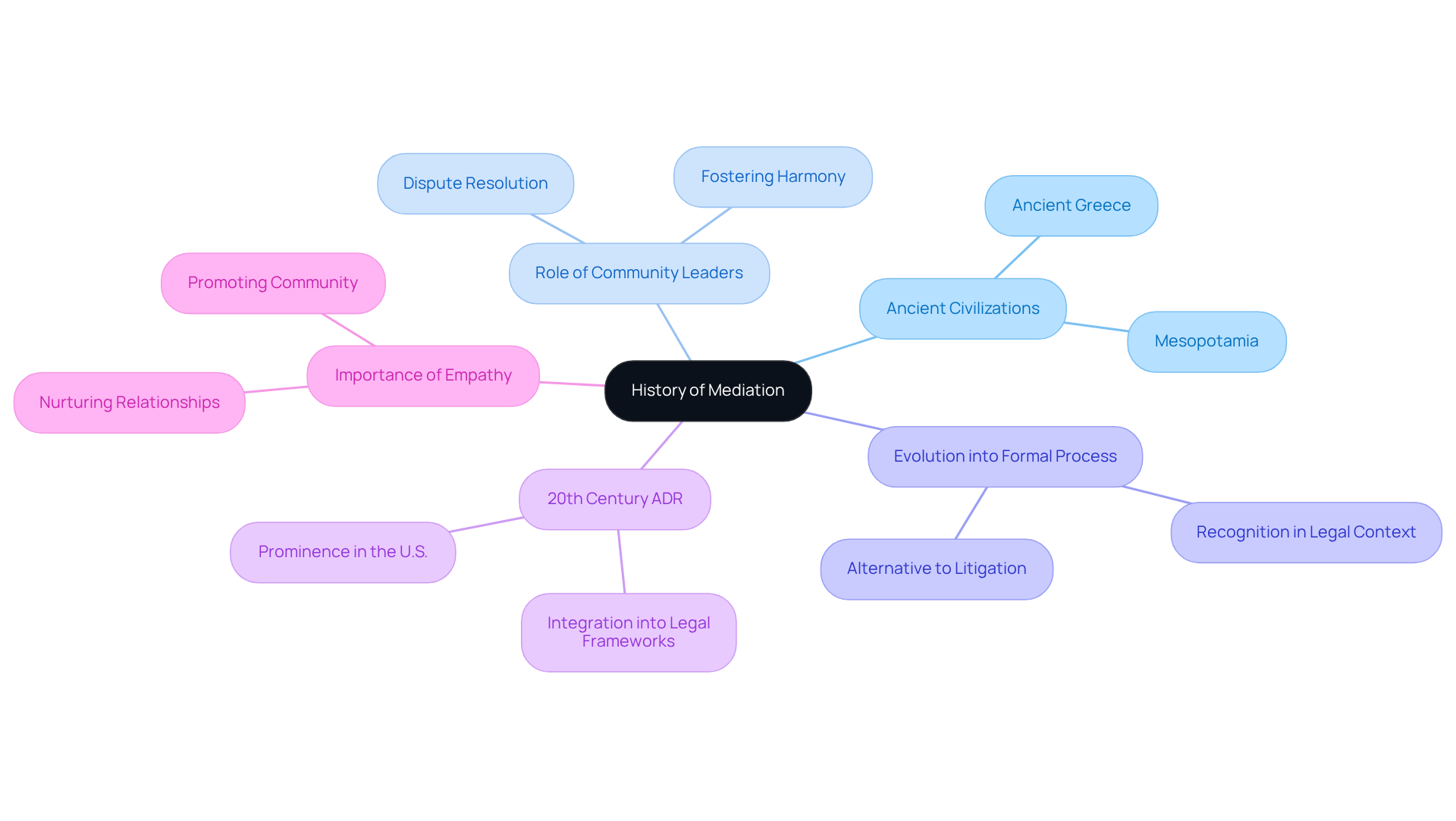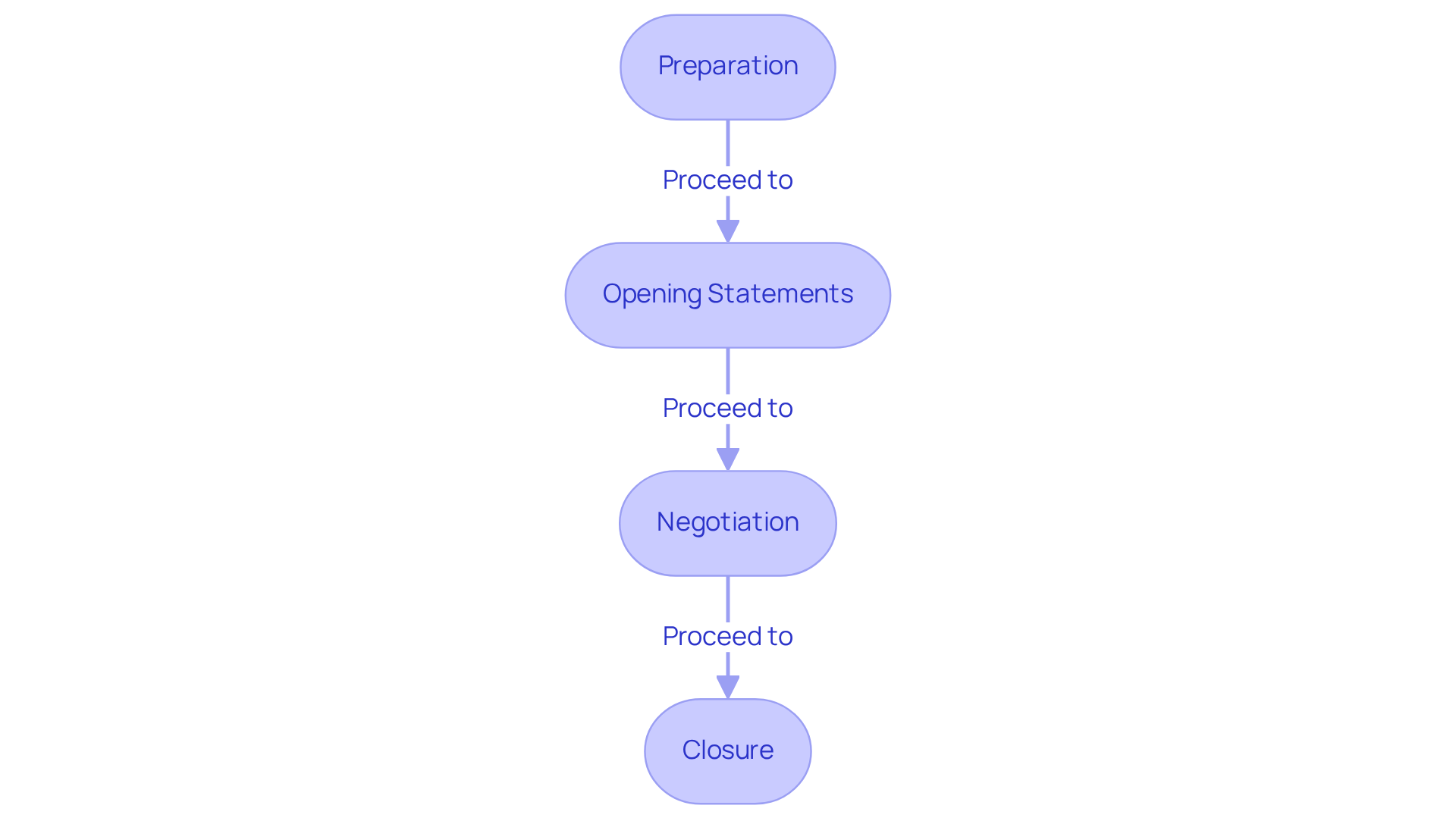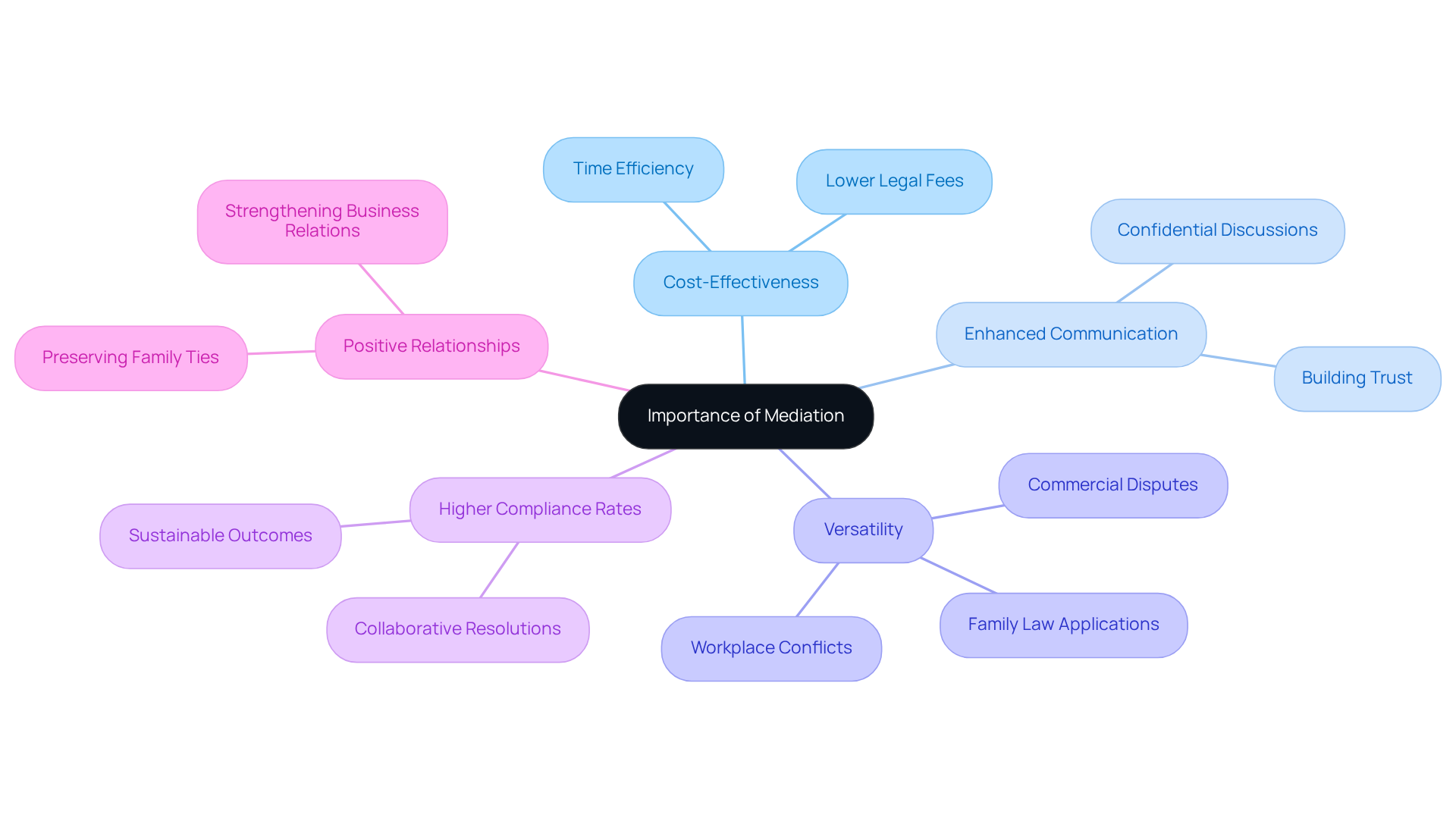
What Does Mediate Mean? Understanding Its Definition and Importance
Overview
Mediation is a structured process that helps conflicting parties communicate effectively, guiding them toward a mutually acceptable resolution. This approach emphasizes that participation is voluntary and that confidentiality is paramount.
Have you ever felt overwhelmed by conflict? Mediation offers a compassionate alternative, providing a cost-effective and time-efficient solution to litigation. It fosters better communication and understanding among all parties involved.
Imagine a scenario where you can express your concerns openly, leading to more satisfactory outcomes. Mediation not only addresses the immediate issues but also nurtures relationships, paving the way for future cooperation. By choosing mediation, you are taking a step toward healing and resolution.
We encourage you to consider this path. Mediation can transform conflicts into opportunities for growth and understanding. Together, we can navigate the complexities of conflict with care and compassion, ensuring that everyone's voice is heard and valued.
Introduction
Mediation represents a truly transformative approach to conflict resolution. It offers a structured process where communication can thrive and mutual understanding can prevail. Imagine a space where you, as an individual, are empowered to take an active role in shaping the outcomes of your disputes. This stands in stark contrast to traditional litigation, which often imposes solutions rather than fostering collaboration.
As more people seek alternatives to the lengthy and costly court processes, a pressing question arises:
- How can mediation effectively bridge the gap between conflicting parties?
- More importantly, how can it nurture relationships and promote lasting resolutions?
By embracing mediation, we open the door to a more compassionate way of resolving conflicts—one that prioritizes understanding and connection.
Define Mediation: Understanding Its Core Meaning
Mediation is a structured process that helps conflicting groups communicate and understand what does mediate mean, guiding them toward a mutually acceptable resolution. Have you ever felt overwhelmed by conflict? Unlike litigation, where a judge imposes a ruling, mediation empowers you to shape the outcome of your disagreement. The mediator doesn’t make decisions for you; instead, they foster discussions that encourage collaboration and understanding.
This process is built on principles of confidentiality and voluntary participation, all while focusing on finding common ground. It’s reassuring to know that Alternative Dispute Resolution (ADR) emphasizes a resolution-focused approach, ensuring practical outcomes that satisfy everyone involved. Mediation offers significant benefits over litigation, including a streamlined process that is often more cost-effective.
Consider the flexibility of conflict resolution services—options like virtual sessions and adaptable scheduling make it easier for you to access the help you need. As conflict resolution expert Victor E. Frankl wisely noted, 'Between stimulus and response there is a space. In that space is our power to choose our response.' This highlights the empowering nature of conflict resolution, allowing you to actively engage in settling your disputes and learn what does mediate mean.
So, why not explore mediation as a viable option? It could be the key to resolving your conflicts in a way that feels supportive and constructive. Together, we can navigate through challenges and find a path toward resolution.

Trace the History of Mediation: Evolution and Development
Mediation has roots that trace back to ancient civilizations, with evidence of its practice found in cultures such as Mesopotamia and ancient Greece. Have you ever considered what does mediate mean regarding how, historically, community leaders or elders often acted as mediators? They played a vital role in helping to resolve disputes within their communities, fostering harmony and understanding.
As time went on, conflict resolution evolved into a more formalized process. In the legal context, mediation, which raises the question of what does mediate mean, became recognized as a viable alternative to litigation, providing a path toward resolution that many find more compassionate. In the 20th century, mediation gained prominence as a method of alternative dispute resolution (ADR), particularly in the United States. It has been integrated into various legal frameworks and practices, offering individuals a supportive way to address their conflicts.
This evolution reflects a growing understanding of what does mediate mean in relation to the importance of empathy in conflict resolution. Mediation not only seeks to resolve disputes, but it also nurtures relationships and promotes a sense of community. If you're facing a conflict, consider exploring mediation as a gentle approach to finding resolution. You are not alone in this journey, and there are resources available to help guide you through the process.

Identify Key Characteristics of Mediation: Processes and Roles
Mediation is a compassionate process defined by its voluntary nature, confidentiality, and the role of a neutral facilitator. It unfolds in several key stages:
- Preparation
- Opening statements
- Negotiation
- Closure
During the preparation phase, the facilitator gathers relevant information and sets ground rules to ensure a fair process. In the opening statements, each side expresses their viewpoint, setting the stage for meaningful dialogue.
The negotiation stage is essential. Here, the facilitator assists the groups in examining alternatives and recognizing shared interests, promoting an atmosphere favorable to cooperation. Ultimately, closure entails formalizing any agreements made, ensuring that all involved are aligned on the outcomes.
The facilitator's role is crucial in preserving a positive and respectful environment during the process. By actively listening and encouraging open communication, facilitators help individuals manage their disputes efficiently. As noted by conflict resolution expert Thomas Crum, "The quality of our lives depends not on whether or not we have conflicts, but on how we respond to them." This highlights the facilitator's duty to guide parties towards fair solutions while honoring their independence.
Empathy is also a vital component in negotiating and resolving conflict. It enables facilitators to build trust and promote innovative problem-solving. Successful negotiation results often depend on the mediator's capacity to foster a supportive atmosphere, ultimately leading to agreements that are acceptable for everyone involved.
Furthermore, consider this: the schedule for accelerated hearings in legal disputes can prolong considerably. This underscores the effectiveness of alternative methods for addressing conflicts. By embracing mediation, we can create pathways to resolution that honor our shared humanity.

Highlight the Importance of Mediation: Benefits and Applications
Mediation plays a crucial role in conflict settlement, which raises the question of what does mediate mean for several compelling reasons. It serves as a cost-effective and time-efficient alternative to litigation, often resolving disputes in a fraction of the time and expense associated with court proceedings. Have you ever felt overwhelmed by the lengthy process of traditional litigation? While conventional litigation can extend for months or even years, alternative dispute resolution usually promotes faster outcomes, enabling individuals to resolve conflicts on their own schedules. This efficiency is particularly beneficial in high-stakes situations where time is of the essence.
Moreover, negotiation encourages enhanced communication and comprehension between groups, which is essential for maintaining connections that could otherwise deteriorate in contentious environments. The confidential aspect of the process promotes open dialogue, allowing parties to share their concerns without the fear of public exposure. This confidentiality not only enhances trust but also lays the groundwork for collaborative problem-solving. Can you imagine how much easier it would be to discuss sensitive issues in a safe space?
Mediation is versatile and applicable across various contexts, including family disputes, workplace conflicts, and commercial disagreements. In family law, for instance, alternative dispute resolution can assist in settling sensitive matters such as child custody and divorce amicably, preserving familial relationships. In workplace settings, it can address conflicts between employees or between management and staff, promoting a healthier work environment. Think about the positive impact this could have on everyone involved.
Conflict management experts underscore the importance of mediation, clarifying what does mediate mean in paving the way for innovative solutions that might not be feasible in a litigated situation. This adaptability enables customized agreements that satisfy the unique requirements of all stakeholders involved, further improving the efficiency of the solution process. Additionally, compliance rates with mediated agreements tend to be higher than those of court orders, as the parties involved have collaborated to reach a resolution. Isn’t it comforting to know that collaboration leads to better outcomes?
Overall, mediation stands out as a preferred method for resolving disputes, offering practical advantages while fostering positive relationships. Concluding with ADR's commitment to value-based pricing and low fees further enhances its appeal, ensuring that clients receive fair and efficient solutions tailored to their specific needs. Together, we can navigate conflicts with understanding and compassion.

Conclusion
Mediation represents a transformative approach to conflict resolution, emphasizing collaboration and understanding over adversarial processes. By redefining how disputes are addressed, mediation empowers individuals to take an active role in shaping the outcomes of their disagreements, fostering a sense of agency and responsibility.
This article has explored the multifaceted nature of mediation, highlighting its historical roots, key characteristics, and the significant benefits it offers. From its evolution as a practice rooted in ancient cultures to its modern applications across various contexts—such as family disputes and workplace conflicts—mediation stands out as a compassionate and effective alternative to litigation. The principles of confidentiality, voluntary participation, and the role of a neutral facilitator are central to its effectiveness, promoting open communication and trust among parties.
Reflecting on the importance of mediation reveals its potential to not only resolve conflicts but also to strengthen relationships and communities. As we navigate complex disputes together, embracing mediation can lead to more constructive outcomes. Have you considered how the power to mediate lies within you? By choosing this path, you can foster an environment of understanding and cooperation.
Explore mediation today and discover how it can facilitate healing and resolution in personal and professional conflicts alike. Together, we can create a more harmonious world.
Frequently Asked Questions
What is mediation?
Mediation is a structured process that helps conflicting groups communicate and understand each other, guiding them toward a mutually acceptable resolution.
How does mediation differ from litigation?
Unlike litigation, where a judge imposes a ruling, mediation empowers individuals to shape the outcome of their disagreement through collaboration and understanding, with the mediator facilitating discussions rather than making decisions.
What principles underpin the mediation process?
The mediation process is built on principles of confidentiality and voluntary participation, focusing on finding common ground between the parties involved.
What are the benefits of mediation compared to litigation?
Mediation offers a streamlined process that is often more cost-effective and emphasizes practical outcomes that satisfy everyone involved.
Are there flexible options available for mediation?
Yes, mediation services often include options like virtual sessions and adaptable scheduling, making it easier for individuals to access the help they need.
What does the quote by Victor E. Frankl signify in the context of mediation?
The quote highlights the empowering nature of conflict resolution, emphasizing that individuals have the power to choose their responses and actively engage in settling their disputes through mediation.
Why should someone consider mediation for conflict resolution?
Mediation can be a supportive and constructive option for resolving conflicts, helping individuals navigate challenges and find a path toward resolution.


